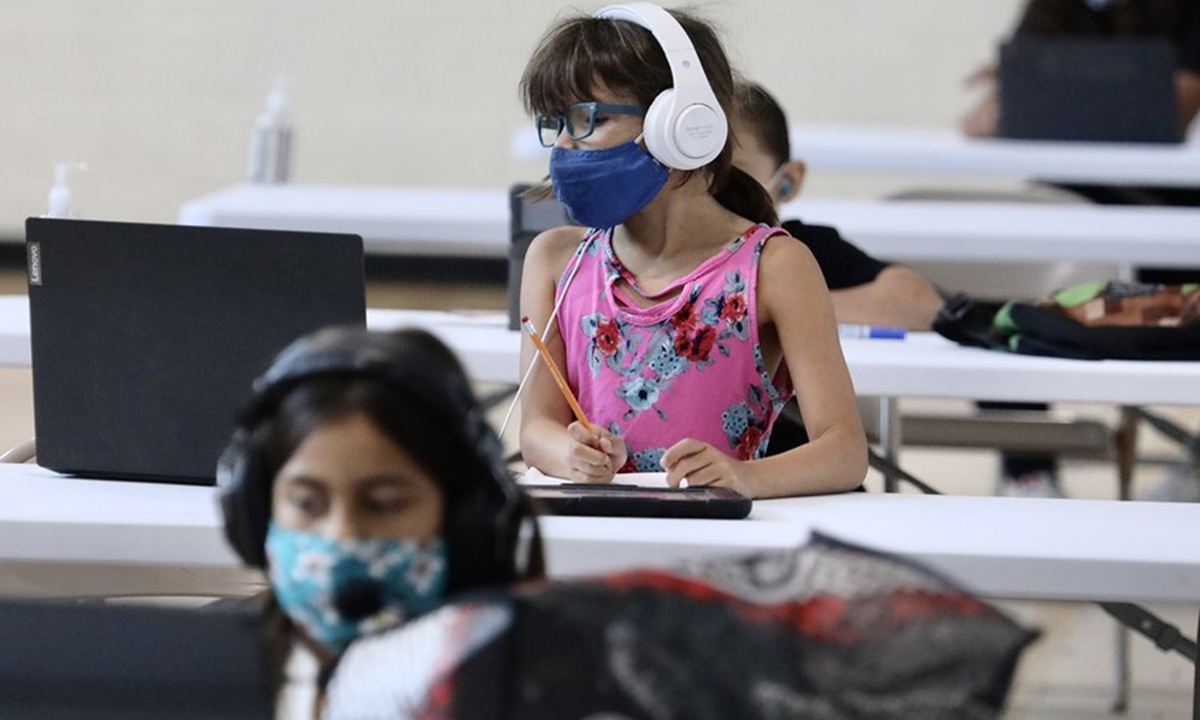
Students study online at a recreation center in Los Angeles, the United States, on Sept. 3, 2020. Photo: Xinhua
Teenagers in America are reporting the highest levels of depression ever recorded. According to a study published earlier this month by the Centers for Disease Control and Prevention (CDC), from 2009 to 2021, the share of American high-school students who self-reported "persistent feelings of sadness or hopelessness" rose from 26 percent to 44 percent.
Of course, the latest government survey in the first six months of 2021 focused primarily on the pandemic and its effects on mental health. It revealed stark differences among different demographic groups, including one figure, that a quarter of girls had contemplated suicide during the pandemic - double the rate of boys. As well, sadness among white teenagers seems to be increasing faster than in other groups.
Derek Thompson, a staff writer for The Atlantic, put forward a rather convincing explanation for this data on April 11. Four forces, he says, are driving teenage despair: social-media use, a decline in sociality, stressors in the world (and news about it) and modern parenting strategies.
Thompson's arguments are well-supported by data and are also notable for looking past the simple explanation of pandemic-induced despair. This should be fairly obvious considering the CDC's acknowledgment that life expectancy was declining pre-pandemic due to "deaths of despair," e.g., things like suicides and drug overdoses.
But there's one major piece missing: politics. In fact, the underlying thread of Thompson's four forces is rooted in politics. Let's go down the line.
First, social-media use is being driven by the fact that algorithms are designed to sap young people of their attention, keeping them online and further feeding the algorithm through data input. There's an old saying that if something is free, then you're the product, well, in this case, everyone is a reservoir of raw materials in the data economy.
The effects of unregulated social media networks have been extraordinarily well documented, both historically and clinically. We know it has deleterious effects on mental health. We also know there are policies that can regulate the data economy - and, in this regard, America lags far behind its peers like China and the European Union.
Second, on sociality. It's true that young people increasingly using technology is cutting down sociality - and so is the ongoing COVID-19 pandemic. But we also have to note how unique America is in its lack of sociality, which stems from policies.
I grew up in suburban America and I graduated high school in 2013, putting me in the first third of the CDC's survey data. I have also lived abroad for several years, including now in Europe. America's lack of walkable cities, lack of public transportation and virtual outlawing of public spaces have extraordinary effects on mental health because it systematically annihilates the idea of community.
Think about it. When you're a teen in un-walkable cities, e.g., the majority of the country, you are reliant on your parents to take you anywhere unless you live in a state where you can drive at a young age and your parents can afford to buy you a car. A lack of public infrastructure means you are basically stranded. It becomes hard to meet friends and have a social life. This is a direct result of anti-social US zoning and housing policies.
On stressors, Thompson mentions political issues that concern young people, especially climate change, mass shootings, war and the pandemic, but seems to play up media coverage of these issues rather than the issues themselves. It may be true that every generation believes that theirs is the most difficult or that they're somehow living in the end times.
One of America's most renowned philosophers, Noam Chomsky, recently said, "We are approaching the most dangerous point in human history." This is quite notable considering Chomsky is 93, grew up in a Jewish community in the middle of the 20th century and is incredibly well-travelled, having been, for example, witness to the Vietnam War and occupied Palestine. Even he can admit that young people today face unprecedented challenges.
Finally, "modern parenting strategies" can be more accurately described as parents being forced to make their kids more competitive because of modern capitalism's perpetual fight to the bottom. Thompson describes how parents are rigorously preparing kids for college admissions and the workforce. Well, this is what happens when the government refuses to spend money on education.
The US, notably, does not have universal higher education like many of its OECD peers. One of the main issues facing young adults now is the student debt crisis, which is up to about $1.6 trillion and was recently paused yet again until August of this year. Parents are forced to co-sign exorbitant loans with their kids if they can't achieve a scholarship, which is draining the country's middle-income bracket.
There are a number of reasons why young people today are feeling despair, but inevitably the problem boils down to politics and the government's inability to meaningfully represent young people. Young Americans are becoming worse off than their parents and they know it. The promise of the American Dream is proving to be unattainable - and that is a depressing prospect for teenagers and young adults.
The author is a Prague-based American journalist, columnist and political commentator. opinion@globaltimes.com.cn




